Fruit Grower Profile: Belvoir Farm
11th October 2023
Nestled in the idyllic Vale of Belvoir in Leicestershire lies Belvoir Farm. At 60 acres, their organic elderflower plantation is the largest in the UK. Fruit & Vine met with owner Peverel Manners, alongside farm manager Keith Challen, at the start of their elderflower harvest.
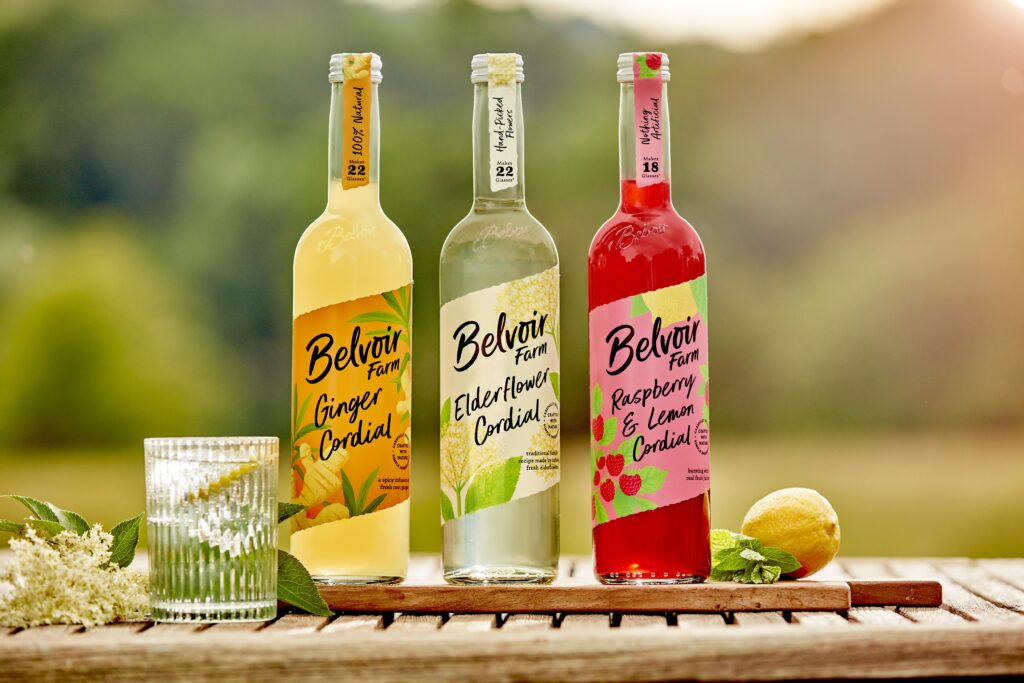
Belvoir Farm’s elderflower cordial is found on the shelves of all major supermarkets and is made using a secret 40-year-old family recipe.
Grower profile:
- Grower: Belvoir Farm
- Location: Vale of Belvoir, Nottingham
- Farm size: 2,700 acres for wheat, barley, field beans and pasture, plus occasionally oilseed rape; 100 acres for wildlife habitat; and 60 acres for organic elderflowers
- Soil type: Heavy clay
- Aspect: The 60 acres of elderflowers are dotted about the farm in five locations. Found within their smaller fields and sometimes in corners of the farm, they’re situated in areas that are sheltered from wind – and that have lighter soil where possible.
- Varieties: Top secret
Introduction to Belvoir Farms
Peverel is the current owner of Belvoir Farm in Nottingham, taking over from his mother Mary Manners and his father John Manners, who started farming the land in the 1950s.
The farm was originally used for dairy farming (like most in the Leicestershire area) but John gradually made the transition to arable due to the drive to grow more food after the Second World War. He bought a D8 Caterpillar cultivator with a very primitive sub-soiler to start getting air into the heavy land.
Alongside growing wheat, maize and barley, John also had a big turkey farm on the land in the early 1960s – interestingly, he was bigger than Bernard Matthews until fowl pest wiped out his entire flock. Pev recalls early childhood memories of ladies plucking turkeys by hand in the sheds that were later used for infusing elderflower.
Pev is proud that the family farm works in support of the wildlife and nature that resides there, alongside crafting their range of natural fruit drinks. Their elderflower cordial, found on the shelves of all major supermarkets, is made using
a secret 40-year-old family recipe.
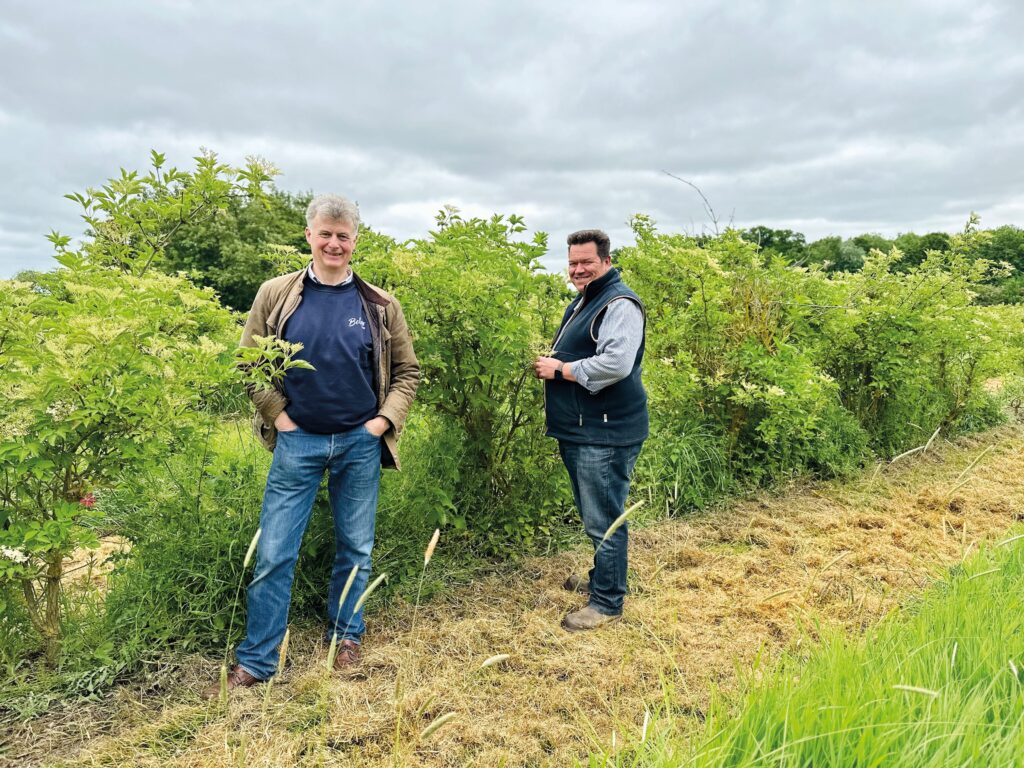
Pictured above are owner Peverel Manners, alongside farm manager Keith Challen
A family recipe
The drinks business started as a diversification on the Manners’ family farm. It all began in their farmhouse kitchen when Mary started experimenting with her own homemade elderflower cordial in a bucket on the kitchen table.
The mixture, decanted into an assortment of recycled plastic and glass bottles, soon became highly sought-after amongst friends, family and the local church. As the drink started to become increasingly popular, John suggested that they try to sell the cordial. In the beginning, John would sell it from the back of his old car to the local delicatessens and farm shops. It was well-received and in high demand, so the following year they made 50% more.
Gradually they moved from making the cordial recipe in buckets, to big plastic tubs, and then cheese vats.
Before they knew it, they were using five cheese vats a year and then five cheese vats a day. Now, they have five 18,000 litre vats in the factory on the farm – and they fill those every day during the harvest season.
A closely guarded secret
At Belvoir Farm, they plant one single variety of elder – and only three employees at the farm know the name of the variety they grow; they don’t tell anyone.
They’ve done intensive research into the different varieties of elders, working out which would have the most flowers and be the easiest to pick. It’s no surprise when Pev says the cordial recipe is also a secret. He explains that alongside the fresh elderflowers, it’s all made from natural, kitchen cabinet ingredients.
They do not use any preservatives, additives, sweeteners or emulsifiers. Pev explained that it’s not just the recipe that has remained the same, but also the way in which it’s made, just on a larger scale. The freshly harvested elderflowers are still hand-stirred into the vats, on the same day they are picked.
Despite the expense, Pev decided to keep his mother’s flower-rich recipe unchanged, even though competitors in the industry have reduced their ingredients to save money. Pev hopes customers will continue to want to pay for an authentic taste, full of strong floral scents.
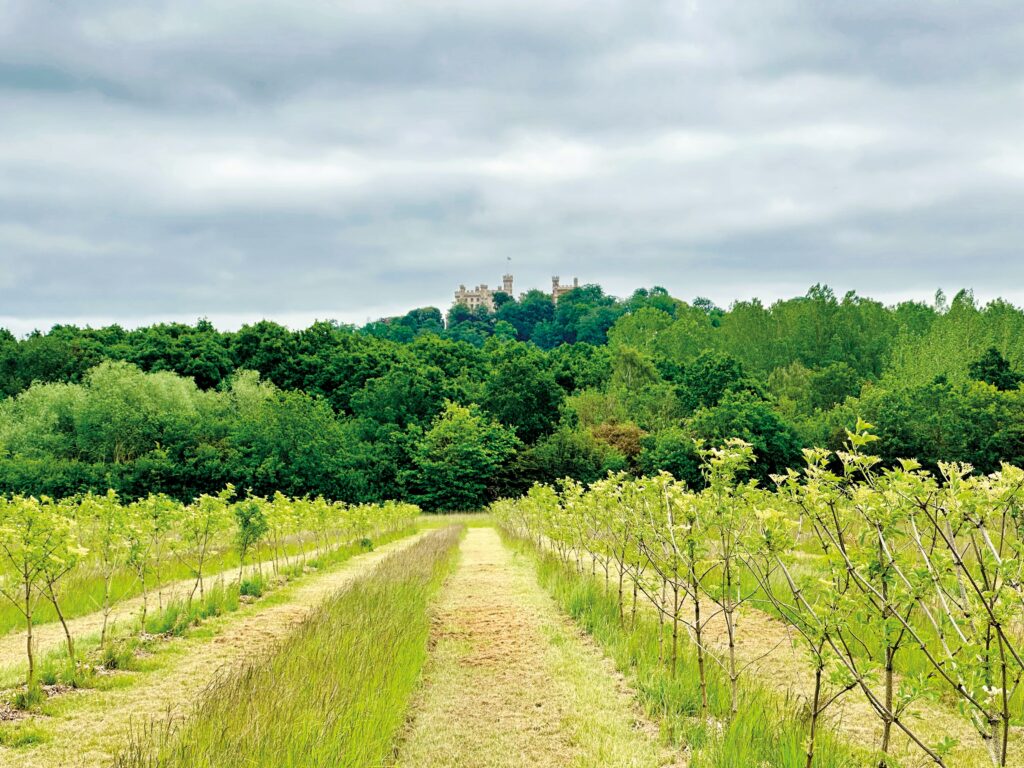
The fields of elder sit amongst the idyllic Vale of Belvoir, with the backdrop of the famous ‘faux historic’ castle and stately home
Elderflower characteristics
They’re a difficult plant to grow according to both Pev and Keith. Elder trees are a woodland glade plant that like their own patch of skylight. They want to be near to other trees, but not next to them, and they’re very difficult to manage as they’ll try to kill other elder trees that grow too close by. They do, however, manage to grow next to blackthorn, which they tolerate.
Because of this, they’re lovingly nicknamed ‘divas’ on the farm. Keith admits he’s got a love/hate relationship with them, because when it goes well, it’s fascinating and the plants reward him.
Soil solutions
Interestingly, the soil at Belvoir Farm is completely wrong for growing elders. The ‘tricky tree’ needs free-draining, brashy soil with frequent rainfall. However, the Belvoir Vale has some of the heaviest clay soils in the country. Some areas on the farm are almost 97% clay which is totally unsuitable, so the team are very careful to locate the lightest patches of soil around the farm.
Before planting, they dig farmyard, organic manure into the beds to improve the soil health and create a nutritious environment in which to grow.
Keith uses 5,000 tonnes of manure across 2,500 acres every year, which creates a much better soil structure. In the fields where large amounts of manure is applied, they notice a significant yield uplift.
Pev and Keith trade the farm’s straw for manure, working together with their neighbours who share a similar vision.
They soil test every year, not just testing for the basics – nitrogen, phosphates and potashes – but also for all minor elements, trace elements and for organic matter, to see how much they are improving the soils.
Historically, the land was worked quite deeply so they now work shallow and wide, helping to achieve a much lower fuel usage in comparison to decades ago.
Keith says he had a steep learning curve when he first joined the farm 13 years ago – knowing a lot about growing combinable crops, but nothing about elderflowers. He’s really enjoying the challenge of farming on some of the heaviest
land in the country, despite knowing it wasn’t going to be easy.
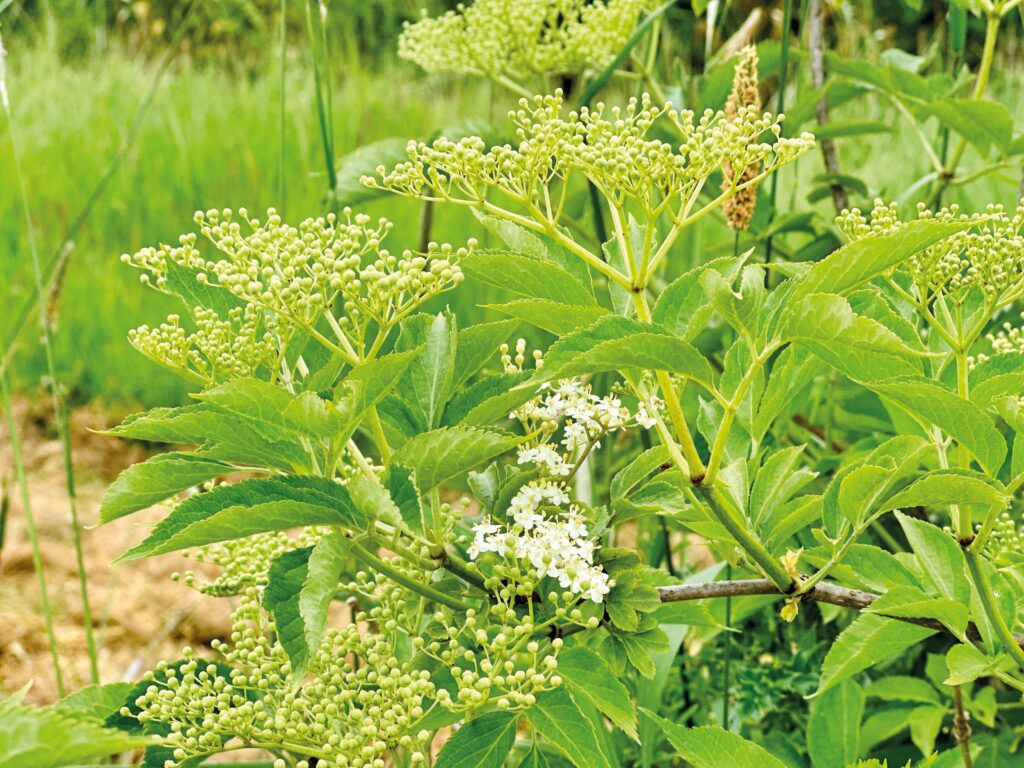
It’s the start of harvest, so around 5% of the elders are flowering. As the weeks progress, that will change rapidly.
Welcoming wildlife
Pev and Keith explain that their love for the environment is their reason for farming. They plant pockets of the land with pollen and nectar mixes from seed merchants just for the birds, butterflies and the bees.
There are three beehives tucked behind the fields of elder trees, and they allow scruffy headlands and borders to grow unruly for wildlife, framing their wheat and barley fields.
Whilst it might look wild and uncontrolled, the planting has been planned carefully. These designated areas are rich with environmental crops so that small birds can feed all through the winter on proteins and oils.
Keith and Pev distribute over 10 tonnes of bird feed a year across tracks and bird feeders on the farm. Four years ago, they planted 2,500 trees to create a deciduous, broad leaf woodland, and they now plant hedgerows every year.
They leave wildlife corridors in every field so the local wildlife can move freely about the farm. Keith reflects on his early mornings at the farm, explaining that there’s no better feeling at 6.30am than venturing down the farm track and watching the fallow deer ahead.
The farm is home to a huge variety of deer – red, roe, fallow and muntjac. They can often be spotted amongst the 80 acres of willow trees that the farm grows for biomass boiler fuel. Pev says that the willow doesn’t make much money, but they continue because it makes for a fantastic environmental habitat – and it doesn’t cost much to grow.
Belvoir Farm has also just entered a project with an ornithological group who have reported seeing an increase in the bird population on the farm since the avian flu outbreak. Keith is proud to point out that they have the largest number of resident yellow hammers on any farm in the East Midlands.
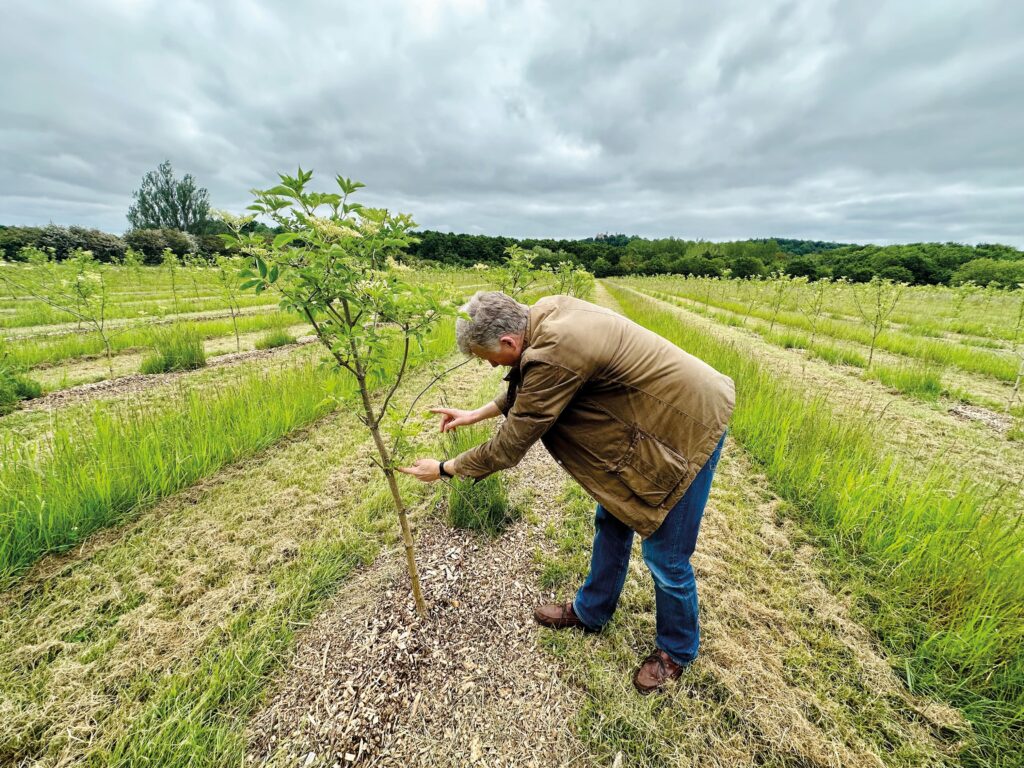
Pev checks on the youngest elder trees on the farm – they’re just three years old compared to others that have been flowering for 35 years.
Managing extreme heatwaves
Reflecting on the 40ºC heatwave that the farm recorded last summer, Pev recalled they didn’t see much of a drop in elderflower yield, but they did notice smaller flowers.
They think this year a heatwave would be even worse because of the wet winter and early spring; Keith explains that the crops haven’t got the root mass that they would ordinarily have, so the plant architecture isn’t set up to cope well with the drought.
They’ve established a few measures to help keep the roots moist. As part of their environmental stewardship scheme, they ‘cut and lay’ hedging; a traditional method to thicken up hedgerows. They take the brash that comes from the process and put it through a wood-chipping machine, including any other foliage from forestry clearing on the farm. The woodchip then locks in the moisture and stops them drying out in the droughts.
Harvest time
The elderflowers are picked by the local community and processed on the same day in the factory on the farm. Their labour force is entirely local, gathered through advertising in the local press, on local radio and by leaflet dropping. This year, within the first two days, they’ve already had over a tonne of flowers brought in – a huge volume, as elderflowers are so light, Keith explains.
They recognise familiar faces who have returned each year for decades. Prior to Brexit, they relied heavily on European workers. Keith remembers the moment when half of the Romanian army turned up to work the harvest one year and he was overwhelmed by their phenomenal work ethic.
The thought of losing these workers, and others like them, caused fear and worry for the farm initially, as they’d always relied on a European workforce for harvest. Through word-of-mouth and local marketing, Pev and Keith have managed to build a local labour force with just as many numbers; it can be as many as 200 pickers each year, often with cars queuing up at the gates.
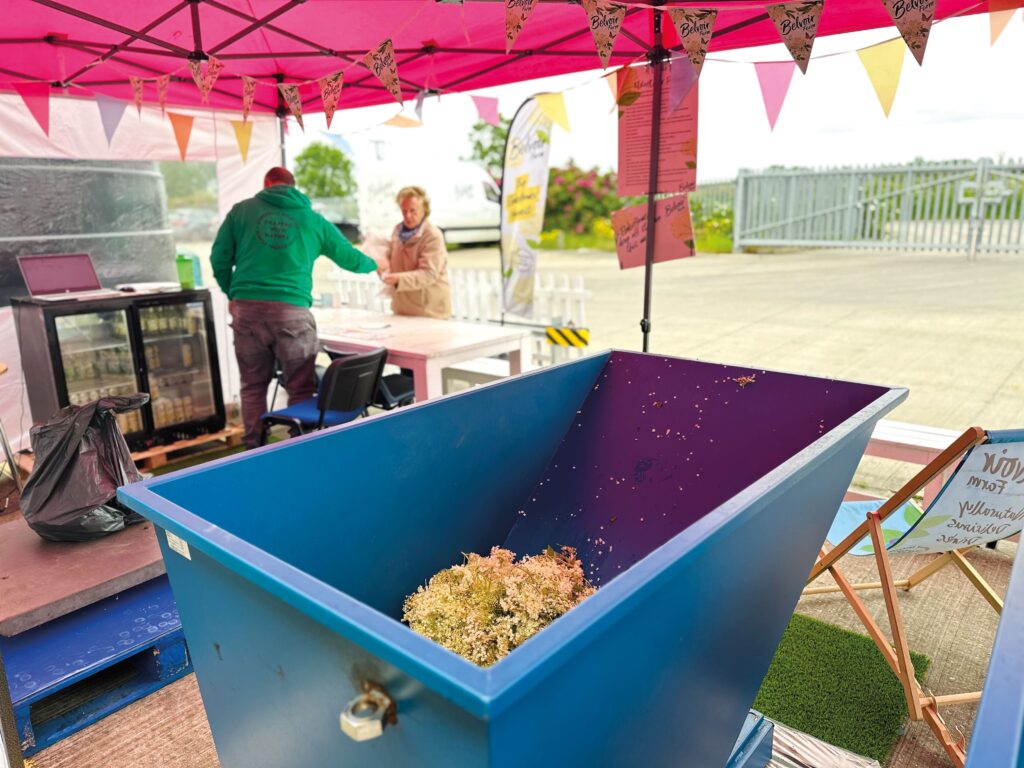
The local community hand their pickings in at the drop-off station, where the flowers are collected and processed on-site that same day.
Hopes for the future
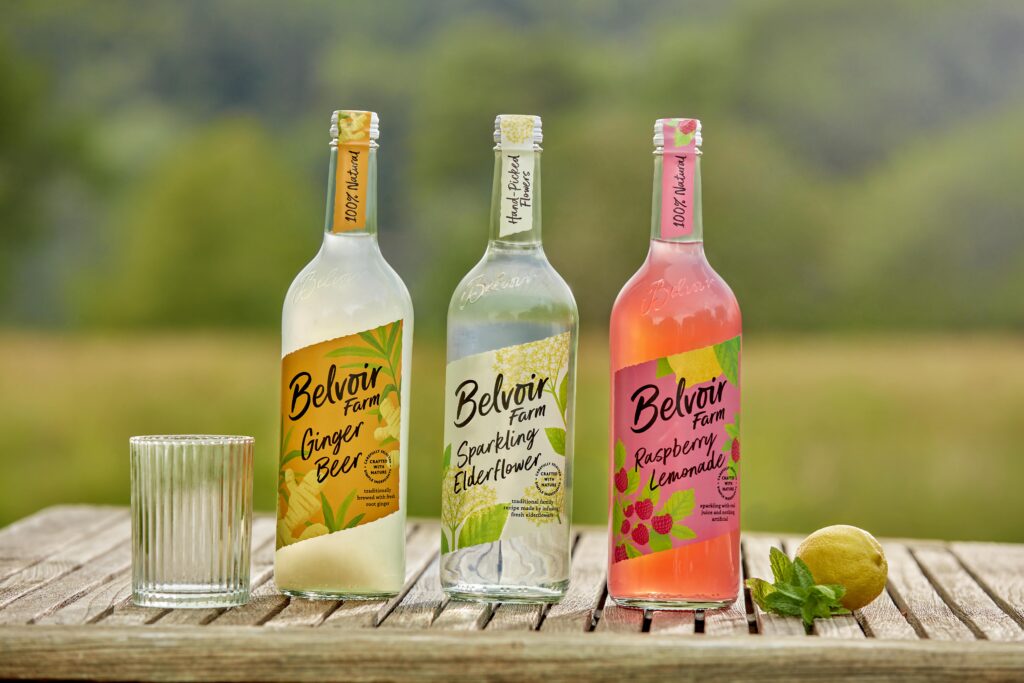
Every bottle – and all of the packaging – is recycled and certified gold-standard.
Belvoir Farm is already a fully sustainable production with a zero-waste landfill site. In good weather they’re almost fully powered by sunshine and on a cloudy day, they’re 60% solar-powered by 400kW of solar panels spanning 150 metres across the top of their farm buildings and factory roofs.
Every bottle – and all of the packaging – is recycled and certified gold-standard. Even the waste liquid goes to an anaerobic digestion plant, to be put in the mixture for power generation.
At the moment they are powered by Calor gas, as it’s more sustainable than diesel. But, they’re looking into hydrogen boilers as the next step, as well as windmills, to progress to the point where their electricity is 100% sustainably sourced.
They want to hand the farm back in a better condition than when they started farming in the 50s and influence the countryside for the better.
